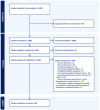Integrated Care for People Living With Rare Disease: A Scoping Review on Primary Care Models in Organization for Economic Cooperation and Development Countries
- PMID: 39772949
- PMCID: PMC11707790
- DOI: 10.1177/21501319241311567
Integrated Care for People Living With Rare Disease: A Scoping Review on Primary Care Models in Organization for Economic Cooperation and Development Countries
Abstract
Introduction/objectives: Individually rare, rare diseases are collectively common resulting in frequent health system use. Navigating the health system persists as a challenge. Primary care provides longitudinal contact with the health system and is placed to provide integrated rare-disease-care.
Methods: This scoping review used Joanna Briggs Institute and PRISMA methods with a Consolidated Framework for Implementation Research based data extraction tool to find how integrated rare-disease-care is delivered, enablers and barriers to the same, in primary care settings in contemporary literature in OECD countries.
Results: The Primary Care Provider (PCP) role varies from routine primary care to shared-rare-disease-care models. In the 26 papers, the most frequently cited PCP roles included involvement in diagnosis (n = 14), care coordination (n = 16), primary and preventative care (n = 18), management of components of rare-disease-care (n = 13), and treatment monitoring (n = 10). Individuals whose PCP was actively involved in their care were reported to have shortened diagnostic delay, improved transitions of care across the lifespan, reduced unplanned utilization of emergency and hospital services, comprehensive psychosocial care, improved quality of life across environments including home, school and work and improved palliative care experiences.
Conclusions: Sufficient communication from specialists, information, resources, time and reimbursement for complex care are still needed. Future integrated-rare-disease-care models should be developed by, or with, PCPs.
Keywords: continuity of patient care; delivery of care; family physicians; general practitioners; implementation science; integrated.
Conflict of interest statement
Declaration of Conflicting InterestsThe author(s) declared the following potential conflicts of interest with respect to the research, authorship, and/or publication of this article: • Author BHR has been an investigator on projects that have received funding from the South-eastern Sydney Primary Health Network. • Author EEP sits on the Medical and Scientific Advisory Committee for Rare Voices Australia. • Author CWMT is a non-executive director, South Western Sydney Primary Health Network. • Other authors declare no conflicts.
Figures
Similar articles
-
Defining the optimum strategy for identifying adults and children with coeliac disease: systematic review and economic modelling.Health Technol Assess. 2022 Oct;26(44):1-310. doi: 10.3310/ZUCE8371. Health Technol Assess. 2022. PMID: 36321689 Free PMC article.
-
The effectiveness of school-based family asthma educational programs on the quality of life and number of asthma exacerbations of children aged five to 18 years diagnosed with asthma: a systematic review protocol.JBI Database System Rev Implement Rep. 2015 Oct;13(10):69-81. doi: 10.11124/jbisrir-2015-2335. JBI Database System Rev Implement Rep. 2015. PMID: 26571284
-
Qualitative evidence synthesis informing our understanding of people's perceptions and experiences of targeted digital communication.Cochrane Database Syst Rev. 2019 Oct 23;10(10):ED000141. doi: 10.1002/14651858.ED000141. Cochrane Database Syst Rev. 2019. PMID: 31643081 Free PMC article.
-
Characteristics of Indigenous primary health care models of service delivery: a scoping review protocol.JBI Database System Rev Implement Rep. 2015 Nov;13(11):43-51. doi: 10.11124/jbisrir-2015-2474. JBI Database System Rev Implement Rep. 2015. PMID: 26657463
-
Depressing time: Waiting, melancholia, and the psychoanalytic practice of care.In: Kirtsoglou E, Simpson B, editors. The Time of Anthropology: Studies of Contemporary Chronopolitics. Abingdon: Routledge; 2020. Chapter 5. In: Kirtsoglou E, Simpson B, editors. The Time of Anthropology: Studies of Contemporary Chronopolitics. Abingdon: Routledge; 2020. Chapter 5. PMID: 36137063 Free Books & Documents. Review.
References
-
- Ferreira CR. The burden of rare diseases. Am J Med Genet A. 2019;179(6):885-892. - PubMed
-
- Linertová R, Serrano-Aguilar P, Posada-de-la-Paz M, et al.. Delphi approach to select rare diseases for a European representative survey. The BURQOL-RD study. Health Policy. 2012;108(1):19-26. - PubMed
-
- European Commission on Rare Diseases. Rare diseases. European Union. 2022. Accessed April 29, 2024. https://ec.europa.eu/health/non_communicable_diseases/rare_diseases_en
-
- OrphaNET. About rare diseases. 2012. Accessed May 30, 2022. https://www.orpha.net/consor/cgi-bin/Education_AboutRareDiseases.php?lng=EN
Publication types
MeSH terms
LinkOut - more resources
Full Text Sources
Medical


